Creating an Age-friendly Society
By Huang Zi-ling (黃紫翎)
Photos by Alberto Buzzola (安培淂)
Abridged and translated by Syharn Shen (沈思含)
Creating an Age-friendly Society
By Huang Zi-ling (黃紫翎)
Photos by Alberto Buzzola (安培淂)
Abridged and translated
by Syharn Shen (沈思含)
Mathilde is a 92-year-old retired teacher who gives English lessons from her apartment in Paris. Her students come from all walks of life—a doctor, a baker, and a fishmonger—who provide her with medical diagnoses, bread, and seafood as exchange for her tutoring and help her when she needs assistance. This scene from the film My Old Lady illustrates how seniors can receive support by sharing their skills and knowledge with others.
France was the first country in the world to experience population aging, with people aged 65 or more reaching 7% of its population in as early as 1864. Today, as the baby boomers—the generation born between 1945 and 1965 after World War II—hit retirement age and have growing needs for support in their older years, there has been an increasing growth of mutual help groups and work exchange programs.
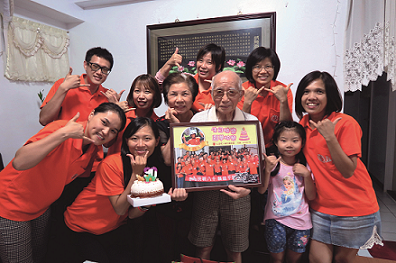
The staff at Hondao Senior Citizen's Welfare Foundation celebrate the birthday of 90-year-old Wu Jing-heng (吳敬恆). Birthday celebrations for the elderly coordinated by volunteers and family members are popular in Hondao's program for exchange of services.
Time Banks: Services Beyond Monetary Value
In Taiwan's agricultural society of the early days when machinery was not common, a support network of labor exchange played a crucial role, especially when harvest time arrived. Farmers would help one another to harvest rice, and the harvester would prepare special dishes for everyone to share and eat together by the rice fields. A culture of mutual help is also found in Taiwan's indigenous groups, such as the Mipaliw tradition of the Amis people, in which members of the tribe would help one another build houses, plant seeds, gather harvests, etc.
With structural shifts in the economy and changes in the way people live, the culture of mutual help has faded over the years, yet it is still found in sectors that require high levels of trust, such as senior care and organic farming. Furthermore, systemized platforms such as time banks have also appeared.
The philosophy of time banking was created by Edgar S. Cahn in the 1980s, following a heart attack that he survived and recovered from with the help of friends. He proposed the concept of time dollars, in which a person's time of service to another person was valued with a time-based currency which can be redeemed and exchanged for services from another person.
In time banking, everyone's time and service are valued equally regardless of the level of skill required for the service given. Its five principles are:
1. Asset: Every person has something of value to contribute
2. Redefining work: Rewarding and recognizing non-paid work that fosters community building and emotional stability
3. Reciprocity: Encouraging mutual help and a sense of achievement through giving
4. Social networks: Building trust in the community
5. Respect: The heart and soul of a healthy community
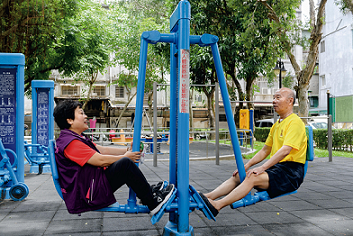
Every week, participants of New Taipei City's senior care program visit the elderly, exercise with them, or help them with physical therapy.
Since its development in the 1990s, over 1,000 organizations in North America, Europe, and Asia have adopted time banks, and nearly 200 million people have benefitted from time banking practices. In Taiwan, which has become an "aged society" in 2018 as the number of senior citizens reached 14.05% of the total population, time banks can help fill the gap in the lack of manpower in senior care.
In 1995, Hondao Senior Citizen's Welfare Foundation has introduced a time bank program to encourage people to volunteer and help the elderly while earning time credits to redeem services for themselves in the future. Yet, over the years, the foundation discovered that participants of the program only accumulated time credits but did not redeem any services. In 2010, the foundation made alterations to the program, transforming it into a platform for volunteer organizations that care for the elderly to exchange services. Volunteers can apply through the platform to find services for themselves or their family members.
A Social Program with a Time-Banking Approach
To cope with the lack of manpower in senior care as well as foster community care for the elderly, New Taipei City Government has launched in 2014 a senior care program with a time banking approach, allowing volunteers who care for the elderly to receive time credits that can be later redeemed for similar services.
Kang Li-zhen (康麗貞) and Wang Li-ying (王麗瑛), both around 60 years old and volunteers of New Taipei City's senior care program, spend Wednesday afternoons visiting 71-year-old Li Cha-mou (李查某), who has suffered two strokes, has mobility problems, and has been living alone after his wife passed away from liver cancer. Li's eldest son, worried for his father's health, applied for the care service. The two volunteers bring Li for walks in the park and listen to him telling family stories. "To become a volunteer in this program, we need to take 18 hours of training. For us, it's a practice and preparation for when we become older ourselves," said Kang.
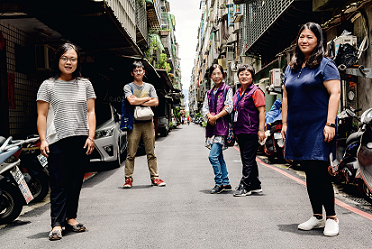
Since New Taipei City launched a senior care program integrating time banking in 2014, about 3,000 people have joined to regularly care for elders in need.
In the program, trained volunteers serve seniors who are 65 years or older and have been evaluated to have needs for assistance, such as those living on their own. Volunteers can walk or exercise with the seniors, help them with some paperwork, or bring them to visit a care center for the elderly in the community. The program allows volunteers to redeem one hour of service given for one hour of service from others in the future. Originally, volunteers could only redeem services when they reach 65, but now, volunteers of any age can redeem their time credits for health classes. To prevent time credits that cannot be redeemed due to a decline in the number of volunteers, New Taipei City has also set up a reserve fund to pay for senior care.
Volunteers of the program mainly offer emotional support to the elderly. Liu Wen-xiang (劉文湘), the head of the social work section at New Taipei City's Social Welfare Department, said that when the program was launched, many seniors did not like having strangers inside their homes. But, after repeated interactions with volunteers, seniors have come to enjoy a new type of relationship that is different from the one with their family. While family members may not have enough patience to listen to the elderly reminisce about their past, volunteers are eager to learn about their stories, which boosts self-esteem and a sense of value in the seniors.
Since time-banking approaches have been adopted in Taiwan over the years, common problems have been found. Time credits are mostly saved and not redeemed, and the matching process between service givers and receivers takes much human resources.
New Possibilities with Technology
Among the current systems adopting time-banking approaches to senior care in Taiwan, an alternative to government-funded programs and private companies is Time Banking Cloud Services, which integrates e-commerce with blockchain technology and customer relationship management.
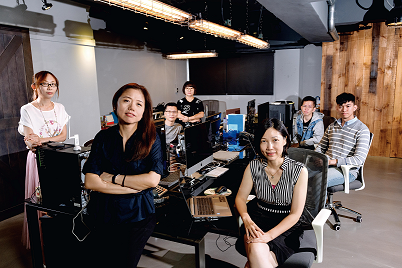
Pictured is the team of Time Banking Cloud Services, one of the few organizations in Taiwan that integrate time banking with blockchain technology to save human resources.
Blockchain, in simple terms, is an electronic ledger of digital currency. What makes it unique is that once data is entered into the blockchain, it cannot be tampered with, personal information is protected, and everything is secured by cryptography. Used in time banking for senior care, a management system for time-based currency can be created, and there is no need for a third-party platform to be involved in the match-making process.
General manager of Time Banking Cloud Services, Lin Qian-ru (林倩如), stated that this system primarily serves company staff, their family members, and volunteers in non-profit organizations. There are two ways to accumulate time credits: participating in volunteer activities and helping other members. The system can immediately make a match between service givers and receivers as well as issue, save, and redeem time credits. Through an app, the receiver applies for a service, matched volunteers receive a notification, and after confirmation from the two parties, service can be offered. Before and after the service is provided, volunteers need to check in and check out through the app. And after the service, both parties rate each other.
Community Care for the Elderly
In addition to time-banking programs and systems offering senior care, there are also support groups in Taiwan that encourage mutual help and foster exchange across different generations.
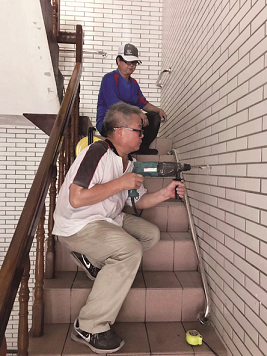
A support group for senior care in Keelung not only installs handrails in the homes of the elderly, but also encourages seniors to share their skills and knowledge to foster mutual help in the community.
An example is the support group for senior care of Bottom Left Corner Workshop in Keelung set up by retired semi-trailer truck driver Guo Fa-cai (郭發財), project specialist Jiang Shu-fen (江淑芬), and city councilor Wang Hsing-chi (王醒之). The group started out by helping install safety features in the homes of the elderly, and later developed a program of mutual help and work exchange to encourage seniors who have received home installation services to pass on the spirit of mutual help by sharing their skills and knowledge in the community.
Sixty-year-old Li Jian-fu (李建富) is retired and cares for his octogenarian mother. Having found the need for a handrail installed at home for his mother to move from her room to the bathroom, he contacted the support group. Li didn't know what skills he could give as exchange, but after talking with the group's specialist Jiang, he realized that singing classic poetry in Hokkien-Taiwanese was a valuable skill, which he later put to use by teaching Hokkien-Taiwanese at a local elementary school.
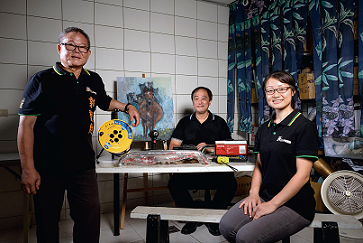
Members of the support group for senior care of Bottom Left Corner Workshop hold weekly meetings to discuss and find ways to help seniors in need of assistance.
Jiang explained that the set up of the support group was not only to help seniors create a safe living environment at home, but more importantly to promote mutual help and exchange in the community. Seniors are not passive receivers of services, but members of the community who can share their valuable skills and precious experiences.
Private organizations also adopt work exchange to bring new experiences in the lives of seniors. An example is the hostel affiliated to Hong Ren nursing home for seniors in Ilan. The hostel manager Wu Chang-qing (吳長青) hopes to encourage travelers to bring new experiences to the seniors in the nursing home in exchange for a bed at the hostel. Only four hours of work is needed for a night's stay.
Since this work exchange started in 2017, many travelers came to share their skills. Hairdresser Chen Xin-wei (陳鑫偉), who regularly travels from Taipei to Ilan to cut his customers' hair, also comes to the nursing home to cut the resident seniors' hair in exchange for stay at the hostel. Another traveler taught mosaic art to the seniors. Wu has also launched a tricycle service for travelers to give seniors with mobility issues a ride about town and buy snacks.
As Taiwan's aging population continues to grow and increasing numbers of seniors face poverty, chronic illnesses, and aging on their own, mutual support organizations and programs integrating time banking or work exchange have become important support systems for senior care.
Mutual help and work exchange build relationships across generations, foster empathy of various needs in different stages in life, and acknowledge the value of all kinds of work. When people in society help one another and share their skills, the elderly will not lose their value in society but can enjoy enriching experiences in life, and people of all ages will have more opportunities to create a healthy and age-friendly society for all.
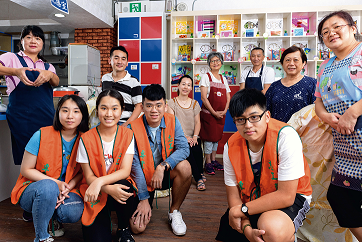
The hostel in Ilan affiliated to Hong Ren nursing home for seniors has been recruiting volunteers of different ages to foster dialogue and exchange across generations.
Contact Us | Plan a Visit | Donate
8 Lide Road, Beitou 11259, Taipei, Taiwan
886-2-2898-9999
005741@daaitv.com
©Tzu Chi Culture and Communication Foundation
All rights reserved.
